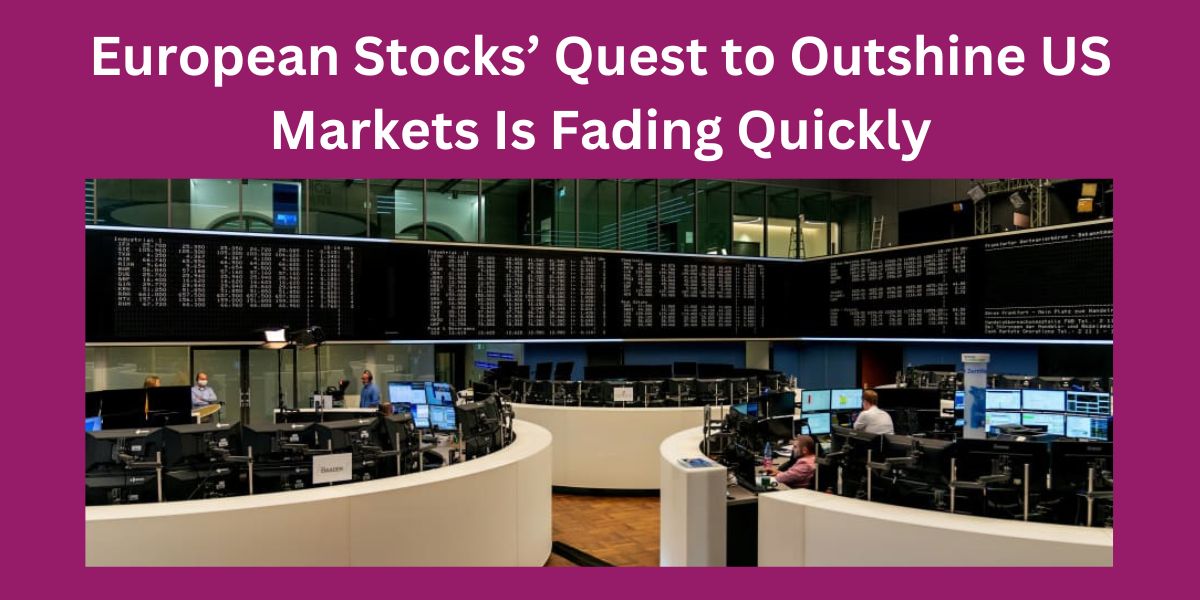The stock market is like a battlefield, where players from all corners of the world are competing to prove their strength and resilience. For quite some time, European stocks have been trying to steal the spotlight from their US counterparts. However, recent trends suggest that this quest is quickly losing steam. What’s causing this sudden change? Let’s dive deep into the European stock market landscape to understand why the dream of outshining US markets is fading away.
The Rise and Fall of European Stocks
A Promising Start for European Markets
European stocks began the year with high hopes, showing signs of strong performance. Several factors contributed to this optimism, such as the European Central Bank’s (ECB) supportive monetary policies, economic recovery post-pandemic, and a sense of stability across the continent. Investors were enthusiastic, and European stocks saw a considerable inflow of investments. It seemed like Europe might finally outperform the US markets, which had been leading the way for years.
The Challenges Start to Unfold
However, as the year progressed, cracks began to appear. The optimism that once fueled the European markets started to dwindle. Various challenges emerged, casting shadows over the market’s bright outlook. Rising energy prices, geopolitical tensions, and inflationary pressures became significant concerns. As these challenges grew, they began to weigh heavily on the performance of European stocks.
The Impact of Inflation on European Stocks
Inflation – A Double-Edged Sword
Inflation is like a silent thief that slowly chips away at the value of money. While some inflation is normal, too much can hurt the economy. In Europe, inflation rates have been rising faster than expected. Higher prices for everyday goods and services reduce consumers’ purchasing power, which in turn affects company profits and stock prices.
ECB’s Response to Inflation
The European Central Bank has been in a tough spot, trying to balance economic growth and control inflation. While the ECB has taken steps to address inflation, such as hinting at interest rate hikes, these measures haven’t been as aggressive as those in the US. As a result, investor confidence has taken a hit, further dragging down European stock markets.
Energy Crisis and Its Effects on European Stocks
The Surge in Energy Prices
Europe is facing a severe energy crisis, with skyrocketing natural gas prices and electricity costs. This surge has been largely driven by supply chain disruptions, geopolitical tensions, and a faster-than-expected economic recovery post-pandemic. High energy costs have been particularly challenging for industries that rely heavily on energy, such as manufacturing and transportation.
The Ripple Effect on Industries
When energy prices go up, it’s not just utility bills that get affected. It creates a ripple effect across various sectors. Companies facing higher production costs may pass these costs onto consumers or cut back on operations, which negatively impacts their profitability. Investors, seeing these challenges, may pull their money out of European stocks, further driving down market performance.
Geopolitical Tensions – A Cloud Over European Markets
Ongoing Conflicts and Market Uncertainty
Geopolitical tensions have always been a concern for investors. Whether it’s conflicts within Europe or tensions with other regions, these issues create uncertainty. And if there’s one thing the stock market doesn’t like, it’s uncertainty. Ongoing tensions between Russia and Ukraine, for example, have created a cloud of uncertainty over European markets, making investors wary of putting their money in European stocks.
Impact on Investor Sentiment
Investor sentiment is a crucial factor in the performance of stock markets. When geopolitical tensions rise, investors tend to adopt a risk-averse attitude, seeking safer investment options. This shift often benefits US markets, which are seen as more stable and resilient. As a result, European stocks lose out, and the quest to outshine US markets becomes even more difficult.
Comparing European and US Market Performance
The Stronghold of US Stocks
Despite the challenges faced globally, US stocks have shown remarkable resilience. The US stock market is like a fortress, continually proving its strength. Several factors contribute to this, including a strong economic recovery, technological innovation, and robust corporate earnings. These elements make US markets more attractive to investors, drawing funds away from European stocks.
Valuation Differences Between European and US Stocks
Another factor that plays a role is the valuation difference between European and US stocks. While European stocks are often seen as more affordable, they haven’t delivered the same level of returns as their US counterparts. This difference in performance makes US markets more appealing, further contributing to the fading quest of European stocks to outshine them.
The Role of Technology and Innovation
US Dominance in the Tech Sector
The technology sector is one of the primary drivers of stock market performance. In this arena, the US has a clear edge. American tech giants like Apple, Microsoft, and Amazon continue to dominate, contributing significantly to the overall strength of US markets. Europe, on the other hand, has fewer tech giants, which limits its market performance. This technological gap further diminishes the chances of European stocks outshining US markets.
European Efforts to Catch Up
Europe is aware of its technological lag and has been making efforts to catch up. Initiatives to boost innovation, digital transformation, and support for tech startups are underway. However, these efforts take time to bear fruit. Until then, the dominance of US tech companies will likely continue to overshadow European markets.
Looking Ahead – What’s Next for European Stocks?
Short-Term Challenges vs. Long-Term Potential
In the short term, European stocks face several hurdles. Inflation, energy prices, and geopolitical tensions are all pressing concerns. However, it’s essential to remember that markets are cyclical. While the quest to outshine US markets may be fading now, European stocks still hold long-term potential. Strong economic fundamentals, innovation initiatives, and strategic policy changes could help European markets bounce back in the future.
The Importance of Diversification
For investors, the key takeaway is diversification. Relying solely on one market or region can be risky. While US markets may currently be the stronger performer, European stocks still offer unique opportunities. Diversifying investments across different regions, including Europe, can provide a balanced approach and mitigate risks.
Conclusion
The journey for European stocks to outshine US markets is proving to be an uphill battle. Inflation, rising energy costs, geopolitical tensions, and a technological lag have all contributed to the fading quest. However, it’s not all doom and gloom. Markets are ever-changing, and with strategic reforms and economic recovery, European stocks could regain their momentum. For now, though, the focus remains on managing the current challenges and navigating through uncertain waters.
FAQs
1. Why have European stocks been struggling recently?
European stocks have faced several challenges, including rising inflation, high energy costs, geopolitical tensions, and a technological lag compared to the US. These factors have led to weaker market performance and lower investor confidence.
2. How does inflation impact stock market performance?
Inflation reduces consumers’ purchasing power, which can decrease company profits and negatively affect stock prices. High inflation also forces central banks to consider raising interest rates, which can lead to lower economic growth and impact stock markets.
3. Why are US stocks performing better than European stocks?
US stocks have shown resilience due to a strong economic recovery, dominance in the technology sector, and robust corporate earnings. These factors make US markets more attractive to investors, leading to better performance compared to European stocks.
4. What role does technology play in stock market performance?
Technology is a significant driver of stock market performance. Countries or regions with strong tech industries tend to have better market performance. The US leads in this area with its tech giants, contributing to the strength of its stock market.
H2: 5. Should investors avoid European stocks entirely?
Not necessarily. While European stocks face short-term challenges, they still offer long-term potential. Diversification across different markets, including Europe, can provide a balanced investment strategy and help manage risks.










